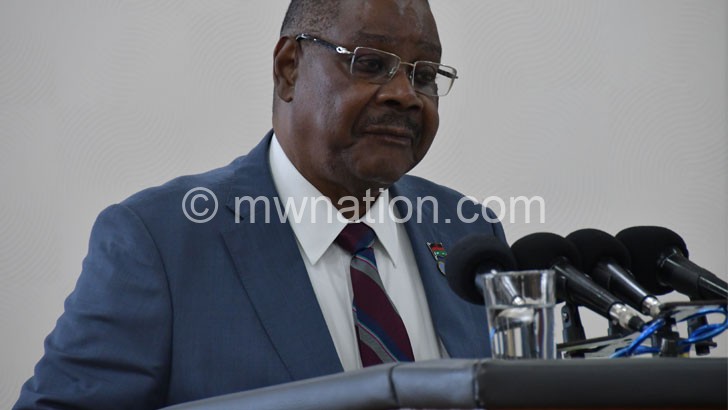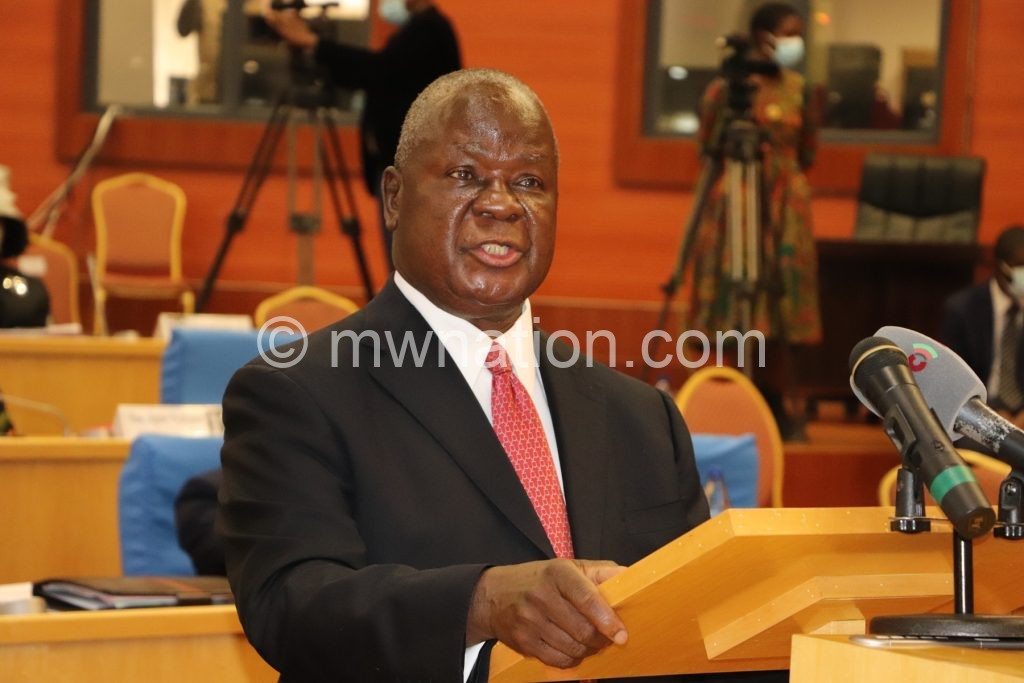APM govt’s cash orgy
Budget documents have shown excess spending in the twilight of former president Peter Mutharika’s administration with State Residences and the Office of the Vice-President blowing more than double their approved allocations.
The Government of Malawi Draft 2020/21 Financial Statement also shows that in the 2019/20 National Budget, security agencies, notably Malawi Defence Force (MDF) and Malawi Police Service spent beyond their approved ceilings.

The State Residences vote, which always had its outturn at the end of the financial year higher than the approved amount and has been known for excess spending over the years, was allocated K7.4 billion in the 2019/20 National Budget.
The State Residences allocation was later revised to K7.8 billion during the Mid-Year Budget Review in February, but ended up spending K15.5 billion, representing 109 percent more than the approved budget—the highest over-expenditure at State House in recent memory.
In the proposed 2020/21 budget, the State Residences Vote has been trimmed to K6.5 billion.

It dwarfs the 44 percent blowout that raised eyes when the Joyce Banda State licked up K2.6 billion, which was K800 million more than its K1.8 billion annual allocation for the financial year ended June 30 2013 by November 2012.
While other ministries, departments and agencies (MDAs) had their allocations either maintained or trimmed; the financial statement also shows that the Office of the Vice-President spent 100 percent more than its approved allocation of K5.6 billion with its outturn closing the year at K10.7 billion.
The proposed budget for the Vice President’s office stands at K2.4 billion, nearly seven times less than the money spent under Chimulirenji.
For nine months in the 2019/20 fiscal year up to February 3 2020 when a five-judge panel of the High Court of Malawi sitting as the Constitutional Court annulled the May 21 presidential election, the office of the Vice-President was occupied by Everton Chimulirenji.
Thereafter, the status quo reverted to the post-2014 election status with current Vice-President Saulos Chilima, who was Mutharika’s estranged deputy having parted ways, as Vice-President and Mutharika at the helm until June when the court-ordered fresh presidential election was held.
The financial statement also shows that Ministry of Homeland Security was caught up in over-expenditure, with its budget climbing by 251 percent from the approved allocation of K3.9 billion to an outturn of K13.7 billion. At mid-year, the figures show that the allocation jumped to K4.2 billion.

This year, allocation to the Ministry of Homeland Security has been trimmed to K7.7 billion, just of half of what it spent in the last fiscal year.
The spending spree did not elude MDF, which spent close to K20 billion more than its allocation or 33 percent more than the approved expenditure of K49.8 billion, according to financial statement.
MDF’s approved amount of K49.8 billion was revised upwards to K61.5 billion at mid-year, but the institution ended up blowing K66.2 billion.
Police was allocated K54.3 billion before the figure was revised upwards to K79.9 billion at mid-year, but ended up spending K75.2 billion at the end of the financial year.
When MDF and police had their allocation revised upwards at mid-year, former minister of Finance Joseph Mwanamvekha and analysts backed the move, saying the political situation then, characterised by demonstrations that at times turned ugly, required investment in the security sector to minimise economic disruption.
In the 2020/21 National Budget being scrutinised at cluster level, police has K60.6 billion and MDF’s allocation stands at K62.6 billion.
In an interview yesterday on the increased expenditure, Minister of Finance Felix Mlusu and Secretary to the Treasury Chauncy Simwaka referred us to the ministry’s spokesperson Williams Banda.
Banda, in his brief response, said: “They [MDAs) implemented more activities than originally planned.”
But Betchani Tchereni, associate professor of economics at The Polytechnic—a constituent college of the University of Malawi—argued in a written response yesterday that several questions will have to be asked regarding what led to the over-expenditure.
He said: “It should have been highlighted by the minister how this over-expenditure came about and most importantly, how was this over expenditure justified to the extent that it was approved by Treasury.”
When contacted yesterday, Mwanamvekha said it was difficult for him to competently comment on the over-expenditure because he was not in office at the time the 2019/20 final figures were being consolidated.
He said in line with the June 23 Fresh Presidential Election and other ‘emerging national needs’, several expenditures could have been made that he may not be aware of.
Said Mwanamvekha: “All monthly transactions are consolidated at every end of the month. Therefore, it means I was not the one consolidating the figures, but the new minister.”
Without directly commenting on individual votes, he claimed that there could have been a lot of expenditure demands during elections, which will be contained in the minister’s expenditure analysis to be presented in Parliament.
But Ben Kaluwa, an economics professor at Chancellor College, another Unima constituent college, said while there may be fear of over-expenditures, it could also mean under-budgeting of resources.
In his budget statement delivered in Parliament on September 11, Mlusu said government will complete the review of the Public Finance Management Act of 2003 in the 2020/21 fiscal year to help strengthen accounting, budgeting, revenue and expenditure management, internal controls and other areas of public finance management.
The Malawi Government fiscal year starts on July 1 and closes on June 30. However, due to the fresh presidential election that ushered in a new administration, the substantive budget was delayed.





